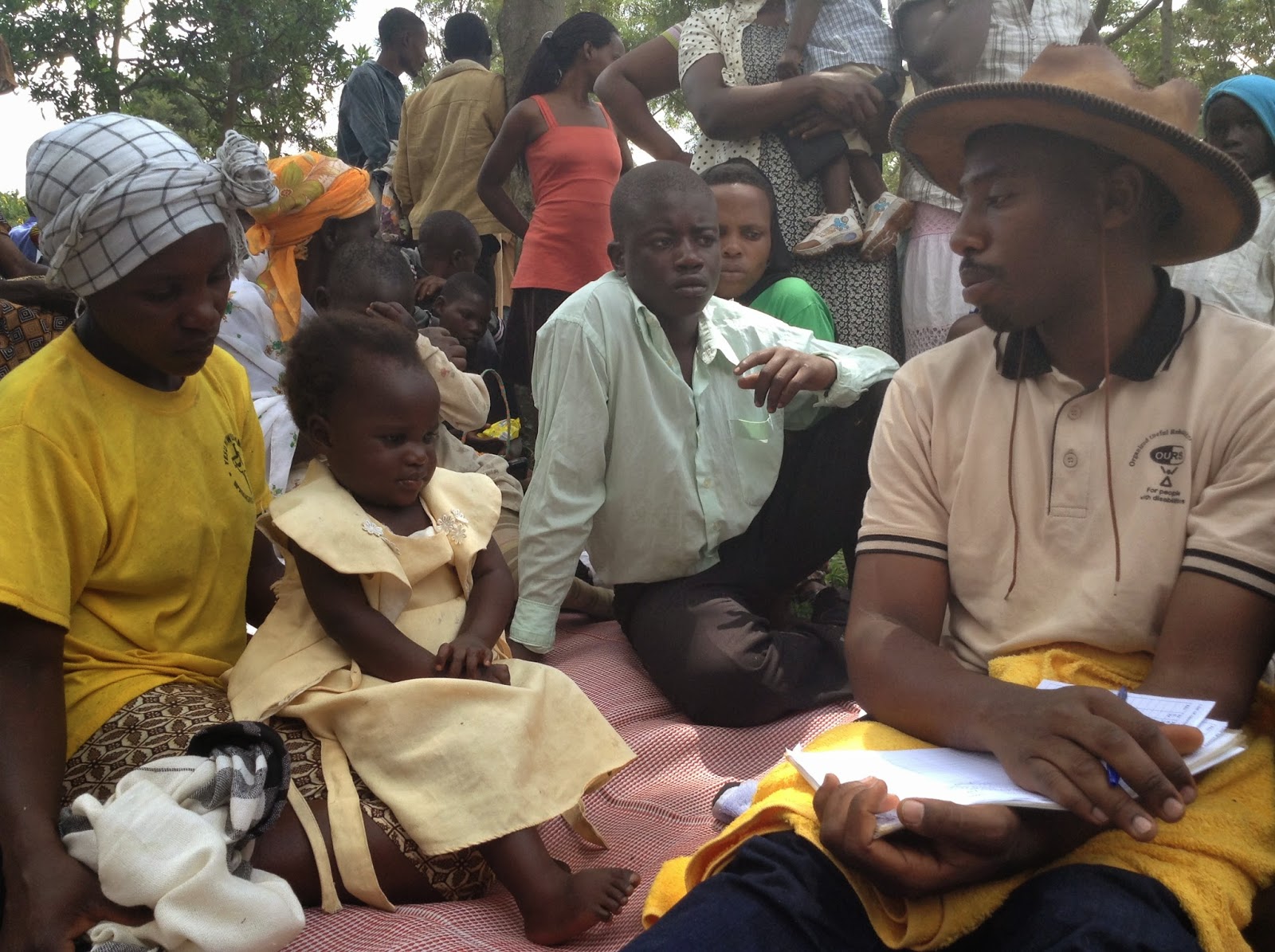In general, I spend two full days a week at OURs (the clinic for children with disabilities), a day at the hospital's weekly pediatric clinic for neurological disorders, and an afternoon at the eye hospital playing with the little ones going through chemotherapy or waiting on surgery for the removal of one or both eyes. I continue to learn language for a few hours each week with my sweet friend Sarah and her baby Sophie in an effort to communicate with the parents and children who come from surrounding villages with no English speaking abilities. I try to take a day off once a week for cleaning (we have a house helper once a week but washing clothes by hand and fighting all the dust takes extra time) , shopping, and preparing food for the week (no packaged anything here so cooking organic from scratch is a necessity not just the in thing to do).
Baby Sophie on her mom's back, taking off after language lessons.
In the eight hours we spent in this village I was exposed to so many different cases for the first time. I saw a child suffering from Spina Bifida walking almost flawlessly after undergoing surgery and maintaining a strict adherence to therapy exercises, and I also witnessed a young girl so malnourished that she cried when touched. I watched as a young boy with Athetoid CP demonstrated his ability to walk comfortably and write with his left hand independently (he was intelligent and able to attend school due to his fathers determination and support), and I also saw a boy of about the same age who had Muscular Distrophy (with no current cure the life expectancy is about 20 years, probably less here) and the mother had to be told she should have no more kids (if she had another boy, he would also have this disability). All she could do for her son was promote exercise to delay the contractures from reaching his heart. Microcephally was a new case for me and rather common here in rural areas where nutrients is lacking for babies of poor and large families. These children have smaller than average heads and therefore their brains were unable to completely develop, delaying all their milestones of development. There were also a couple cases of hydrocephalus which I have never seen first hand until I came here. So many of these same disabilities do exists at home but because of the US's wide array of medical resources these children are attended to immediately after birth. The knowledge of the staff at medical clinics in the villages is so basic that many disabilities are never recognized until the parents acknowledge an issue with their child and seeks further attention. Our medical convoy bought a few of the worst cases home with us that evening while many others were referred. Please do join me in praying for these children and their families; that the families would know how to care for and unconditionally love on their children with special needs and that the children would find joy despite the hardships and stigmas they encounter every day.
My friends at OURs sending us off with kisses and goodbyes as we take off in our jeep for outreach.
We picked up this little guy in front and his family on the way to outreach because they could not afford transport. He really loved playing with Ricarda and myself (the two "Omuzungus" or white people).
Ambrose, the OT at OURs educating the masses as children come forward to be seen.
A sweet little one who found her way to the front to play with me and the little ones in their therapy.
Hundreds of school children would periodically leave school during breaks to watch the therapy and special needs education.
Ambrose sharing this young girls diagnosis with her young mom.
Ricarda playing with one of our new friends.
This healthy little one sneaked through the crowds to come play beside the children in therapy.
These two got closer and closer as they were feeling us out. They rarely see white people in the villages.
This is the church where the mobilizations happen for this village. We were working on the field directly in front of this building as well as in that building behind the church,
The school children lined the jeeps as we were preparing to take off. I taught them how to "pound it" and they taught me some local dance moves.
The sun setting on our journey back to Ruharo.














You are finding your African rhythm. So many experiences and so much love. I look forward to your posts and pictures. Lovely job dear!
ReplyDelete